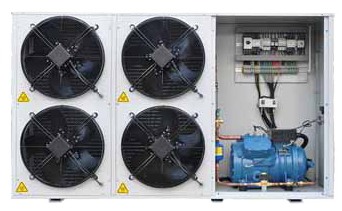Storage in industrial cooling systems is of critical importance for businesses to preserve their products in the best way possible and deliver them to consumers fresh and safe. A correct storage strategy ensures that product quality is maintained, energy efficiency is increased and operating costs are reduced. In this article, we will talk about the importance of storage in industrial cooling systems and ideal storage strategies.
Importance of Storage
Maintaining Product Quality
The quality of products, especially food items, stored in refrigeration systems depends on proper temperature and humidity control. Products that are not stored at appropriate temperatures can quickly deteriorate, lose their freshness, or pose health risks.
Food Safety
Industrial cooling systems prevent food from being contaminated by harmful microorganisms. If the correct temperature and hygiene conditions are not provided, these microorganisms can multiply rapidly, causing food to spoil and posing a threat to consumer health.
Energy Efficiency
A correct storage strategy optimizes energy consumption. Correct product placement helps the cooling system to operate more efficiently and prevents unnecessary energy consumption.
Reducing Operating Costs
Storage strategies allow businesses to keep costs under control by minimizing product loss. A good storage plan reduces waste by extending the shelf life of products.
Storage Strategies
Proper Temperature and Humidity Control
Each product has its own storage temperature and humidity level. Therefore, it is necessary to divide storage areas into sections and keep each section in the right conditions. For example, meat and dairy products are usually stored at lower temperatures, while vegetables and fruits may require different humidity levels.
Orderly Placement of Products
Placing products in an orderly and accessible manner in the storage area not only saves energy but also facilitates the management of products according to the first-in, first-out (FIFO) method. In this way, old products are consumed first and spoilage is prevented.
Insulation and Energy Management
Good insulation of storage areas minimizes energy loss. In addition, regular maintenance of cooling equipment should be carried out and modern, energy-saving technologies should be used to increase energy efficiency.
Safe and Hygienic Environment
Keeping storage areas hygienic minimizes the risk of contamination. Regular cleaning and disinfection should be carried out and personnel should be trained in hygiene.
Capacity and Layout of Storage Area
The capacity of the storage area should be appropriate to the needs of the business and overcrowding should be avoided. Overfilled warehouses can reduce the efficiency of the cooling system by preventing air circulation.
Data Monitoring and Control Systems
Modern storage strategies use automatic data monitoring systems to monitor temperature and humidity levels. These systems can instantly detect any potential temperature changes, preventing damage to products.
Conclusion
Storage in industrial cooling systems is a vital element not only for the preservation of products but also for the overall efficiency and profitability of the business. Correct storage strategies optimize energy consumption and reduce operating costs while preserving the quality of the products. Therefore, when planning storage in cooling systems, the strategies mentioned above must be implemented meticulously. Companies specializing in industrial cooling, such as TünelGroup, continue to lead the sector by offering the most suitable solutions to businesses in this regard.
Kaynak: Tunelgroup Cooling System



















































